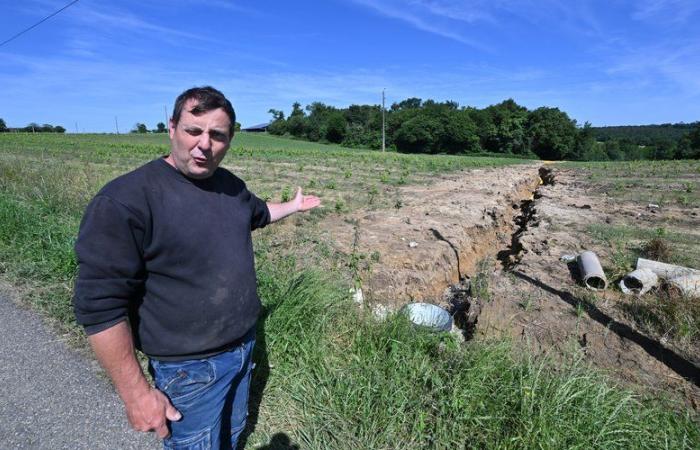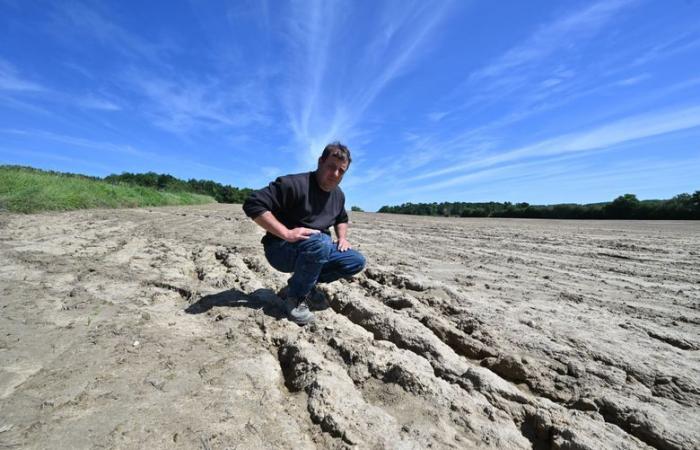the essential
Victim of the violent stormy episode which hit the north-west of Gers last weekend, David Ploquin is only just beginning to heal the gaping wounds on his farm in Montreal.
According to him, David Ploquin had never seen this. Neither did his father, a retired farmer in his eighties. The stormy episode observed on the night of Saturday June 8 to Sunday June 9 in the north-west of the Gers was incredibly violent and did not spare its mixed crop-breeding operation, which extends between Montreal-du -Gers and Castelnau-d’Auzan. The farmer says: “It started around 9:30 p.m., without stopping. The storm came from Eauze and it remained stationary at our place, ending at 12:30 a.m. with a cumulative rainfall of 205 mm, between the hamlet of Arquizan and Bretagne-d’Armagnac Obviously, at that time, we hear the noise but we don’t realize the damage.”
Sunday morning, the spectacle will not necessarily be striking around the farm, located at the highest point of the hamlet. However, an initial inventory will allow us to assess the damage caused by the storm. A plot of vines found themselves literally cut in two, the water having carried away the earth covering a freshly installed drain. In these conditions, it is difficult to maintain the young colombard plants planted last year. “I can no longer process, I can no longer pass the tractor through my vines,” laments David Ploquin, who had to replant 1.5 ha of vines on this plot.
DDM – NEDIR DEBBICHE
On a neighboring plot, an embankment collapsed following a landslide, now preventing any tractor maneuvering at the end of the rows of vines. In addition to the clearly visible consequences of bad weather, David Ploquin is now worried about the appearance of mildew, his vines having already been affected by the disease last year. “After 205 mm of rain, we have to go back behind to treat. We’ve all been there since yesterday (Editor’s note: Wednesday). As we pass through our vines, we notice gullies, flooded plots… That’s when we realize the extent of the damage.”
“We are asking that this be classified as a natural disaster and an agricultural calamity”
A little further away, in Castelnau-d’Auzan, the farm’s cereal fields (corn, sunflower, wheat and sorghum) were also not spared by the torrential rains. A critical situation to which the prefect of Gers, Laurent Carrié, was made aware, who traveled to Montréal-du-Gers on Monday to observe the damage with the farmer. “We are asking that this be classified as a natural disaster and an agricultural calamity since insurance does not work on loss of funds. They only work on crop losses,” underlines David Ploquin.
DDM – NEDIR DEBBICHE
Victim once again of climatic hazards, after the frost in 2021 and the hail in 2022, the farmer does not hide his dismay and is already thinking of stopping the cultivation of cereals. “It is no longer possible. The Olympic averages have fallen so much that there will no longer be any point in insuring it. There is no longer any point in having flooded fields, with falling prices and rising costs. Against the climate, it’s complicated to adapt and put things in place,” he breathes.
“My son has big questions about the recovery”
Beyond his personal case, David Ploquin wonders about the future of his farm, his son working there for a year as an agricultural employee. “There are big questions about the recovery. We cannot envisage or plan anything,” he concludes. For the moment, it’s just a matter of healing the wounds.







